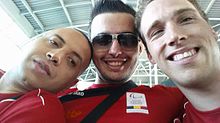Belgian men's goalball team departs for Finland for World Championships
Thursday, June 26, 2014

Image: Klison Mapreni.
This morning European time, the Belgium men's national goalball team departed for Espoo, Finland for the 2014 IBSA Goalball World Championships. The championship is the biggest competition since the 2012 Summer Paralympics.
The team is scheduled to play their opening game on the morning of June 30 against Brazil men's national goalball team. They are scheduled to play their second game of pool play against Turkey men's national goalball team later that afternoon. Their remaining games in pool play are against Canada, Lithuania, Egypt, China and Japan.
The members of the team are Bruno Vanhove, Tom Vanhove, Klison Mapreni, Youssef Bihi, Wassime Amnir and Glenn Van Thournout. They are coached by Jean Claude Meulemans and Werner Van Thournout. 30-year-old teammates Bruno and Tom Vanhove are sextuplet brothers, who have been part of the national goalball program for about ten years. Three of the sextuplets, including Bruno and Tom, are visually impaired. When playing, Bruno can throw the ball at speeds of up to 60 km/hour, while Tom can throw the ball at just under 55 km/hour.
Last month, with all but one of the same roster scheduled to compete at the World Championships, the national team competed at the Belgian-hosted Parantee Paralympic Championships. They lost to Algeria 7–11, defeated Russia 11–5, lost to the United States 3–13, defeated the Netherlands 10–5, narrowly lost to Finland 5–6, and lost to Lithuania 6–13.
Goalball was created in 1946, exclusively for people with a visual disability and designed to help with the rehabilitation of veterans returning from World War II. Play in the Paralympics consists of two twelve-minute periods, with a three minute break between halves. Players are blindfolded to ensure all are equally visually handicapped on-court, and the game can be stopped to ensure goggles are properly fitted. Standing in front of a long goal, they throw the ball at the opposition team's net who in turn try to block it by listening to the ball, which contains a bell, and using their bodies to prevent the ball from going in. The audience is asked to remain silent during play.
Related news
- "Wikinews interviews Tyan Taylor, Australian goalball player" — Wikinews, September 4, 2012
Sources
- Goalball Belgium. "Goalball Belgium" — Facebook, June 26, 2014 (access date)
- "Schedule" — International Blind Sports Association, June 26, 2014 (access date)
- Goalball Belgium. "Goalball Belgium" — Twitter, June 26, 2014 (access date)
- "Teams" — International Blind Sports Association, June 26, 2014 (access date)
- "2014 Parantee" — Goalball Scoreboard, May 5, 2014
- "Goalball" — ParaChamps Belgium, May 5, 2014
- "Parantee Paralympic Championships" — International Blind Sports Association, 2014
- "Vanhove Brothers Lead Belgian Goalball Team" — International Paralympic Committee, May 18, 2012
